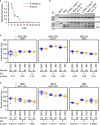Paternal imprinting of dosage-effect defective1 contributes to seed weight xenia in maize
- PMID: 36100609
- PMCID: PMC9470594
- DOI: 10.1038/s41467-022-33055-9
Paternal imprinting of dosage-effect defective1 contributes to seed weight xenia in maize
Abstract
Historically, xenia effects were hypothesized to be unique genetic contributions of pollen to seed phenotype, but most examples represent standard complementation of Mendelian traits. We identified the imprinted dosage-effect defective1 (ded1) locus in maize (Zea mays) as a paternal regulator of seed size and development. Hypomorphic alleles show a 5-10% seed weight reduction when ded1 is transmitted through the male, while homozygous mutants are defective with a 70-90% seed weight reduction. Ded1 encodes an R2R3-MYB transcription factor expressed specifically during early endosperm development with paternal allele bias. DED1 directly activates early endosperm genes and endosperm adjacent to scutellum cell layer genes, while directly repressing late grain-fill genes. These results demonstrate xenia as originally defined: Imprinting of Ded1 causes the paternal allele to set the pace of endosperm development thereby influencing grain set and size.
© 2022. This is a U.S. Government work and not under copyright protection in the US; foreign copyright protection may apply.
Conflict of interest statement
The authors declare no competing interests.
Figures




References
-
- Denney JO. Xenia includes metaxenia. HortScience. 1992;27:722–728. doi: 10.21273/HORTSCI.27.7.722. - DOI
Publication types
MeSH terms
LinkOut - more resources
Full Text Sources

